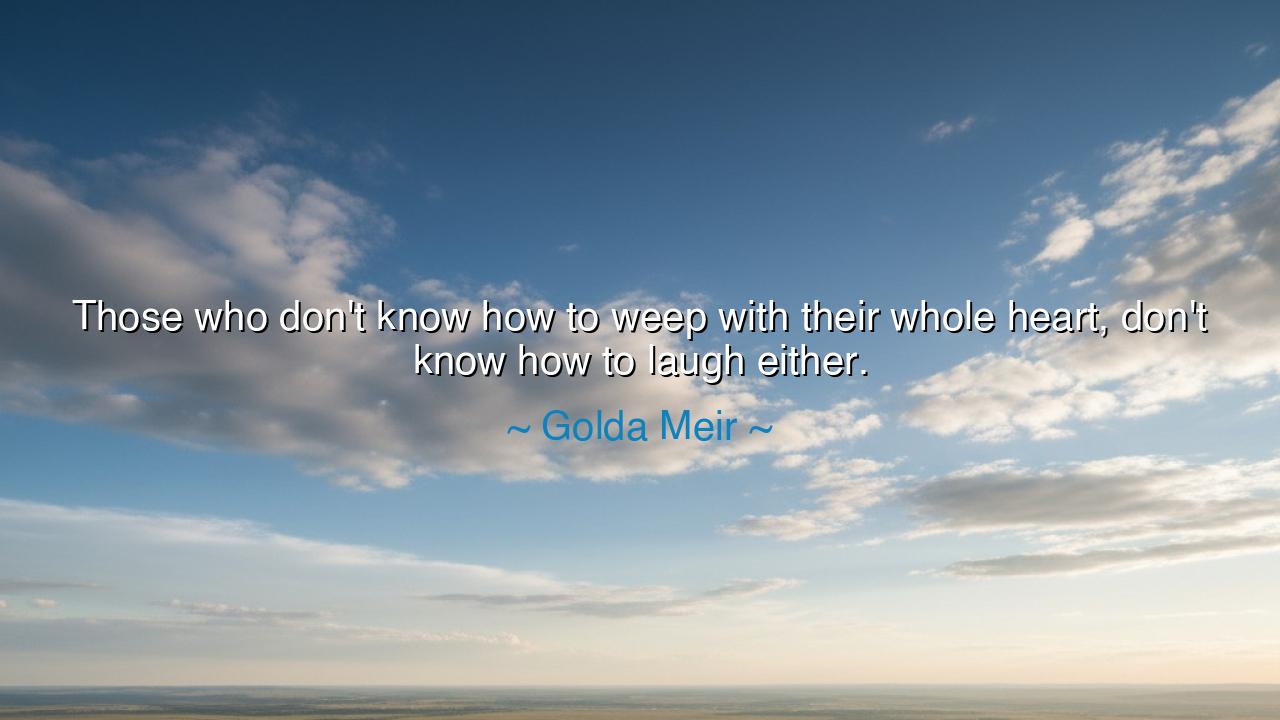
Those who don't know how to weep with their whole heart, don't
Those who don't know how to weep with their whole heart, don't know how to laugh either.






The words of Golda Meir, “Those who don’t know how to weep with their whole heart, don’t know how to laugh either,” are born from the crucible of experience — from the heart of a woman who led her people through exile, struggle, and renewal. In this single sentence, Meir speaks the truth that the ancients have known since time began: that sorrow and joy are twin children of the same soul, and that one who denies grief also denies the fullness of life itself. For tears and laughter are not opposites, but mirrors of one another — each giving depth and meaning to the other.
To understand Meir’s words, one must first understand her life. Golda Meir, the fourth Prime Minister of Israel, lived through a time when her people knew both the abyss of loss and the triumph of survival. She saw her nation rise from the ashes of despair, its laughter hard-earned and sacred. To her, emotion was not weakness but strength — the sign of a soul alive, capable of compassion and resilience. When she said these words, she was teaching a truth not only for her people but for all humankind: that the heart which can break is the same heart that can truly rejoice.
In the wisdom of the ancients, the soul that does not weep is called unripened. The Stoics and poets alike understood that sorrow, embraced fully, does not destroy us — it refines us. For how can one know the sweetness of laughter without first tasting the salt of tears? The man who suppresses grief to appear strong grows hollow; his laughter, when it comes, is shallow and brittle. But the one who has wept with his whole heart knows that joy, when it arrives, is a resurrection. The ancients would have said that such a soul has walked through Hades and returned bearing light.
Consider the story of Nelson Mandela, who spent twenty-seven years in a prison cell, stripped of freedom and dignity. Yet when he emerged, he bore no bitterness — only strength and joy. His laughter, deep and genuine, came not in spite of sorrow but because of it. His tears had softened his heart, not hardened it. He wept for his people, for the injustice of the world, and in doing so, he kept his humanity alive. When at last he smiled, his joy carried the weight and wisdom of every tear shed in silence. Like Meir, he understood that true laughter is born only from hearts that have known sorrow and survived it.
Meir’s words also carry a warning for our time — an age where many flee from emotion, fearing vulnerability. We are taught to hide tears, to armor the heart against pain. But the ancients would call this a mistake, for to shut the door on sorrow is to exile half of life. A heart that refuses to grieve becomes numb, and numbness is not peace — it is absence. Only by allowing ourselves to feel deeply can we live fully. The tear and the laugh are both prayers — one of pain, one of gratitude — and both rise to the heavens together.
In her own life, Golda Meir led not from detachment, but from empathy. She wept for her soldiers, for mothers who buried sons, for children who grew up amid conflict. Yet she also found room to laugh, to love, to celebrate the miracle of life. Her strength lay not in being unfeeling, but in being human — fully, vulnerably, passionately human. To her, emotion was not weakness; it was proof of connection, proof that one still cares enough to weep, and therefore still dares enough to hope.
The lesson, then, is this: do not fear your tears, for they are the rivers that cleanse the soul. When grief comes, let it move through you, not as an enemy but as a teacher. And when joy follows, let it rise from the same place — deep, honest, and whole. The heart that has felt deeply knows that laughter is not the denial of sorrow, but its healing. Just as dawn follows night, joy blooms only where tears have watered the ground.
So remember, children of tomorrow: weep without shame, and laugh without restraint. Feel everything — for that is the mark of the living. To weep with your whole heart is to open it; to laugh with your whole heart is to fill it. As Golda Meir teaches us, both are sacred acts, two sides of the same divine truth — that to live fully is to embrace both the sorrow that shapes us and the joy that redeems us.






AAdministratorAdministrator
Welcome, honored guests. Please leave a comment, we will respond soon